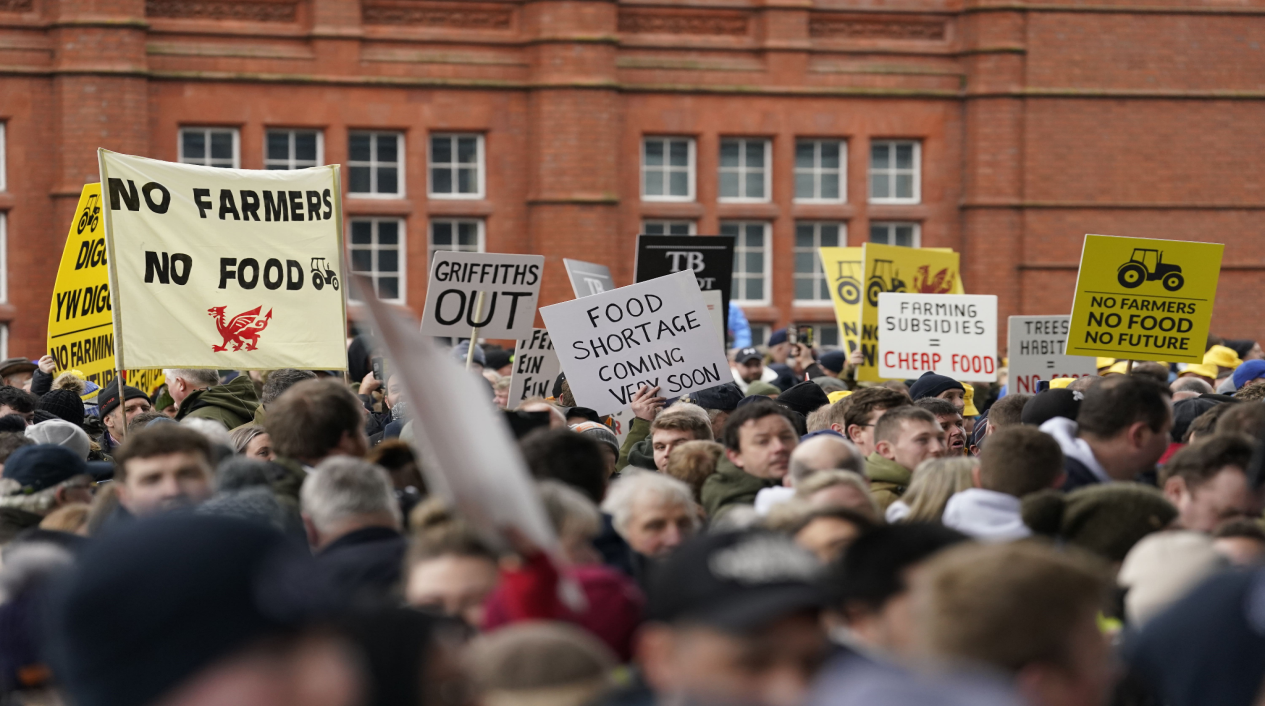Free Courses Sale ends Soon, Get It Now


Free Courses Sale ends Soon, Get It Now



Copyright infringement not intended
Picture Courtesy: https://www.independent.co.uk/news/uk/protesters-welsh-government-welsh-labour-cardiff-bay-welsh-b2503996.html
Context: Spanish farmers protest in Madrid over price pressures, taxes, and green regulations, reflecting pan-European grievances amid climate change impacts.
Details
Climate Change and Farmer Protests
|
In Indian Context ●Agriculture is a crucial sector in India, employing a significant portion of the population and contributing significantly to the country's GDP. However, Indian agriculture is heavily dependent on monsoon rains, making it vulnerable to climate change impacts such as droughts and floods. ●Farmer protests in India have been ongoing for years, with various groups advocating for agricultural reforms, fair prices for crops, and debt relief. These protests intensified in late 2020 and early 2021 with the introduction of new agricultural laws by the Indian government, which farmers argue would deregulate the agricultural sector and leave them vulnerable to exploitation by large corporations. |
|
How Climate Change and Agricultural Policies Affect Farmers |
||
|
Factor |
Explanation |
Impact on Farmers |
|
Climate Change |
Erratic weather patterns: Unpredictable rainfall patterns disrupt planting and harvesting schedules, leading to lower crop yields and income uncertainty. |
Reduced income: Lower yields mean less income for farmers to cover their expenses. Increased risk: Unpredictable weather makes it harder for farmers to plan and manage their crops. |
|
|
Droughts and floods: These extreme weather events can destroy entire crops, leading to significant financial losses and debt. |
Debt burden: Crop losses can force farmers to take on debt to cover their expenses, increasing their financial vulnerability. Food insecurity: Droughts and floods can lead to food shortages in affected areas. |
|
|
Pests and diseases: Warmer temperatures create favourable conditions for pests and diseases to thrive, further damaging crops and reducing yields. |
Reduced productivity: Increased pest and disease prevalence leads to lower crop yields and income. Increased costs: Farmers may need to spend more on pesticides and other measures to control pests and diseases. |
|
Policies |
Inadequate support: Government policies may not provide sufficient support for farmers, such as through fair pricing, access to credit, or infrastructure. |
Low income: Lack of adequate support makes it difficult for farmers to earn a decent living. Increased vulnerability: Farmers are more vulnerable to economic shocks and climate change when they lack proper support. |
|
|
Introduction of new laws without consultation: This can lead to concerns and confusion among farmers, especially if the new laws are perceived to be detrimental to their interests. |
Loss of trust: Lack of consultation can damage trust between farmers and the government. Increased anxiety: Uncertainty about the impact of new laws can create anxiety and stress among farmers. |
|
|
Concerns about loss of minimum support prices (MSP): MSPs are a government-guaranteed minimum price for certain crops. Farmers fear that losing them could lead to a significant drop in their income. |
Reduced income: If MSPs are lost, farmers could receive lower prices for their crops, leading to financial hardship. Market instability: Loss of MSPs could make the agricultural market more volatile, making it harder for farmers to plan their finances. |
|
|
Dismantling of the traditional procurement system: This system ensures that farmers have a guaranteed market for their crops at MSP. Farmers worry that dismantling this system could leave them vulnerable to exploitation by private companies. |
Loss of bargaining power: Without the traditional procurement system, farmers may have less bargaining power when selling their crops, potentially leading to lower prices. Increased dependence on private companies: Farmers may become more dependent on private companies for selling their crops, which could give these companies more power over the market. |
What steps can the Government take?
Challenges
Way Forward
Conclusion
Must Read Articles:
EARTH’S SOARING TEMPERATURE: https://www.iasgyan.in/daily-current-affairs/earths-soaring-temperature#:~:text=According%20to%20a%20March%202023,consumption%20and%20production%20of%20goods.
Climate Change and Animals: https://www.iasgyan.in/daily-current-affairs/climate-change-and-animals
|
PRACTICE QUESTION Q. Climate change has unequal impacts on farmers across the globe. Farmers in developing countries are often the most vulnerable yet may have less political leverage. How can international agreements and policies ensure that climate justice for farmers is achieved on a global scale? |
© 2024 iasgyan. All right reserved